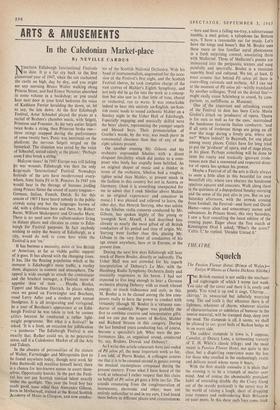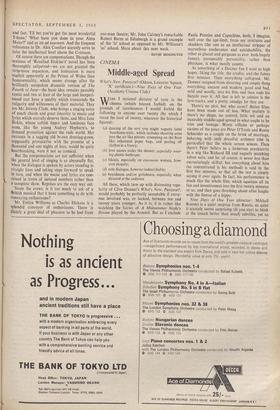THEATRE
Squelch
The Passion Flower Hotel. (Prince of Wales.)— Entlyn Williams as Charles Dickens. (Globe.) THE British musical is not unlike the mechani- cal nightingale of which I wrote last week. You take off the cover and there it is, costly and gaudy. You wind it up and it sings, 'Chirrup ... chirrup,' its unwearied but infinitely wearying song. The sad truth is that whatever there is of lightness, whatever of charm, whatever niceties of characterisation or subtleties of humour in the source material, will be tramped deep, deep into the mud. The stampede is all, it seems, we shall be allowed to see; great bulls of Bashan hedge us in on every side.
The saddest stampede in town is, I suppose, Camelot, at Dreary Lane, a tormenting travesty of T. H. White's classic trilogy; and the most recent is Passion Flower Hotel, not quite in this class, but a dispiriting experience none the less for those who revelled in the enchantingly erotic and delicate novel whose name it bears.
With the first double entendre it is plain that the evening is to be a triumph of matter over mind. And of course the abominably prevalent habit of entending double (by the Crazy Gang out of the seaside postcard) is the surest way in the world of raising a laugh, short of dropping your trousers and embroidering Rule Britannia on youi' pants. In this show such lines come thick
and fast. 'I'll bet you've got the most wonderful T-bone,' What have you done to your Alma Mater?' and so on ad nauseam. And the frequent references to Dr. Alex Comfort scarcely serve to raise the intellectual level above the C-stream.
Of course there are compensations. Though the sexiness of 'Rosalind Erskine's' novel has been thoroughly saltpetred—we are not granted the strip-tease sequences, and lesbianism is more explicit apparently at the Prince of Wales than homosexuality, which seems strange after the brilliantly outspoken dramatic version of The Fourth of June—the basic idea remains passably comic and two at least of the large and inexperi- enced cast have a quality which transcends the vulgarity and witlessness of their material. They are Mr. Je-remy Clyde, who brings a singing voice of much charm and great sincerity to music and lyrics which scarcely deserve them, and Miss Jane Birkin, whose coltish figure and luminous face seem, like the young Audrey Hepburn's, to demand protection against the rude world. Her entrance in a sagging old brown dressing-gown, supposedly provocative with the promise of a thousand and one nights of love, would be quite heartbreaking, were it not so comical.
But the compensations are not sufficient when the general level of singing is so abysmally flat, when the dialogue is spoken by actors standing in straight lines and taking steps forward to speak in turn, and when the music and lyrics are con- ceived in terms of isolated numbers rather than a complete show. Reprises are the easy way out.
Stone the crows, is it too much to ask of a British musical that it have something to do with conveying enthusiasms?
Mr. Emlyn Williams as Charles Dickens is a splendid conveyor of enthusiasms. There is Plainly a great deal of pleasure to be had from one-man theatre; Mr. John Cairney's remarkable Robert Burns at Edinburgh is a grand example of the 'is' school as opposed to Mr. Williams's `as' school. More about this next week.
DAVID BENEDICTUS































 Previous page
Previous page